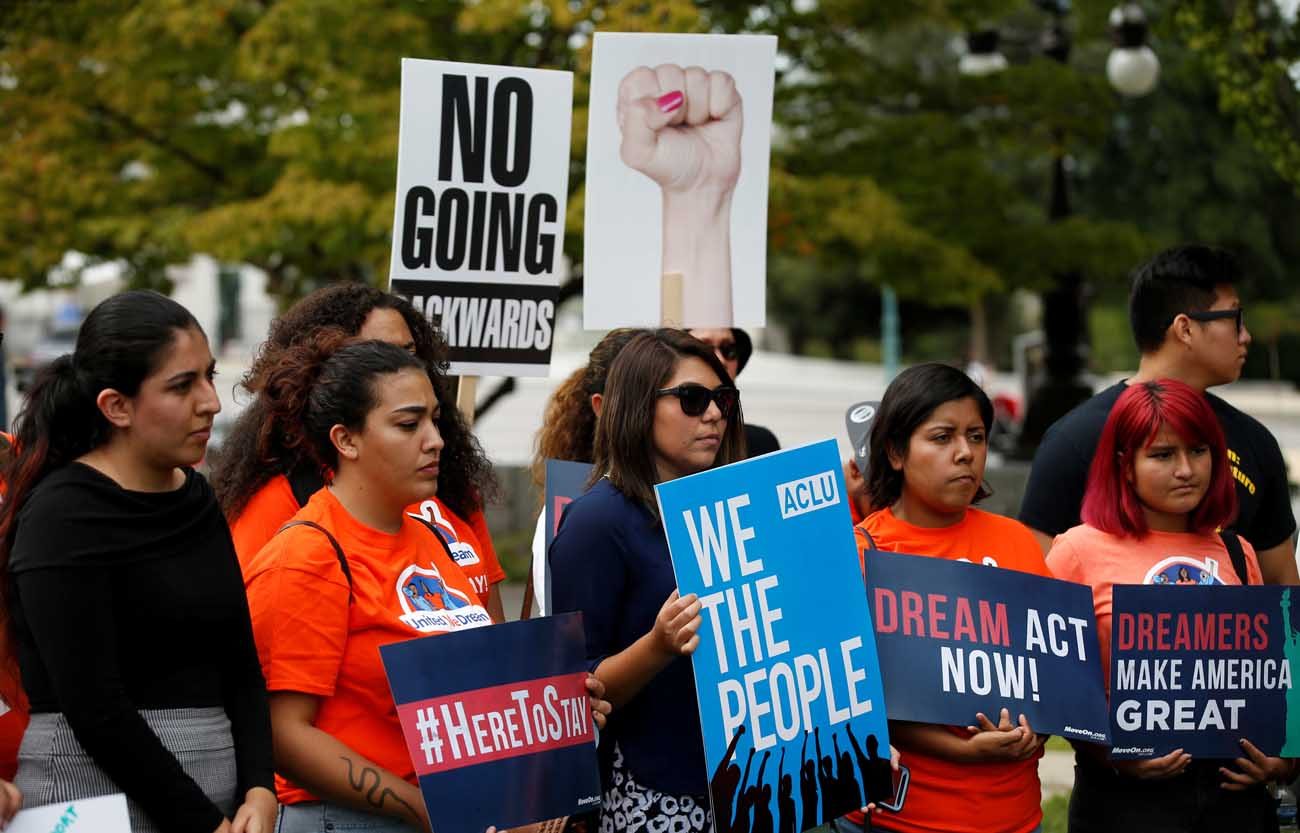WASHINGTON (CNS) — Catholic college leaders who have protested the Trump administration’s plan to do away with the Deferred Action for Childhood Arrivals program, known as DACA, also have heightened their resolve to do more for DACA students and have expressed cautious belief that federal legislation to give these students more permanent help could be at hand.
“Maybe this is the moment” where something will happen, said Donna Carroll, president of Dominican University just outside of Chicago, the day after President Donald Trump discussed a potential DACA deal at the White House Sept. 13 with House Minority Leader Nancy Pelosi, D-California, and Senate Minority Leader Charles Schumer, D-New York.
The private discussion was downplayed by Trump on Twitter, who said: “No deal was made last night on DACA,” about the meeting with Democrat leaders but just a day later he confirmed something could be in the works, telling reporters: “We’re working on a plan for DACA.”
[hotblock]
DACA, instituted by President Barack Obama in 2012, allows some 800,000 young people brought to the United States illegally as children to stay in the country and work or go to school with a temporary reprieve from deportation — providing they meet certain criteria. Attorney General Jeff Sessions announced Sept. 5 that the program would end in six months if Congress did not pass legislation to make the program permanent.
Carroll, Dominican’s president for 24 years and a longtime advocate for immigration reform, takes a long view of DACA and the Development, Relief and Education for Alien Minors Act, or DREAM Act, which was introduced in 2001 and has repeatedly failed to pass. The measure would offer the chance of permanent legal residency to those who arrived in this country illegally as children.
“This changes with every narrative every day,” Carroll cautioned the 100 DACA students who attend Dominican University in a letter she wrote to them after the Sept. 5 announcement that DACA was ending.
Despite her outrage at the decision, she told students that she hopes the broad negative reaction to it could provide impetus for the Dream Act to pass.
Carroll, who also issued a statement as did many Catholic college presidents opposing the decision to rescind DACA, told Catholic News Service that her letter to the students was important to “give them a sense of certainty and support” in this time of such uncertainty.
She said the DACA students on campus are obviously anxious, but they also are resilient and pushing forward, and she urged them to continue that spirit and to “hunker down and focus on their academic progress.”
In the meantime, the university, like other Catholic colleges and universities around the country with DACA recipients, has continued or even upped its assistance to these students with financial, legal and spiritual resources for them as their future lies in the balance.
Patricia McGuire, president of Trinity Washington University, said she spoke to the 100 DACA students, or “Dreamers,” at her school after the announcement that the program was ending and they were “extremely stressed out” and particularly worried for their families because their work permits are often the sole source of family income.
They worry about what will happen if they lose their ability to work or to have a driver’s license, she said.
McGuire assured students they would continue to receive scholarships from the university and she also said the university was adding group support sessions and extending them to include the families of “Dreamer” students.
When university alumnae have been in touch with the school wondering how they can help these students, McGuire urges them to get in touch with their representatives in Congress and push for passage of the Dream Act.
Ann McElaney-Johnson, president of Mount St. Mary’s University in Los Angeles, said she absolutely has called her representative and would continue to do so — regularly.
She is impressed that Catholic university presidents and the U.S. bishops have been vocal in their support of DACA. “We really stand, as a Catholic Church and Catholic universities, together on this,” she said, adding: “We are standing with these students and we will do everything we can to see that their futures are secure.”
McElaney-Johnson said the mood on campus is mixed among DACA students who feel stressed for themselves and their families but who also have “a certain resolve to do everything they can to stand up for their rights.”
[hotblock2]
“The students feel this, but everyone else feels it too,” she told CNS. “There is a strong sense of resolve that we have to take care of these students and make our voices heard.”
Speaking up for DACA students has been the rallying cry of Trinity’s McGuire, who told Catholic higher education leaders during a Sept. 5 presentation at the University of Notre Dame to boldly defend them.
“If ever there was a time for Catholic higher education to act on its deepest values, to stand in solidarity with the poor and disposed of this earth, the time is now,” she said, urging the college presidents and administrators to “be on the right side of history and social justice.”
She also reached out to the broader higher education community in a Sept. 8 column for Inside Higher Ed, an online website, stressing that higher education should “consider doing something we rarely do — join forces across industries and social organizations to let Congress know how wide and deep the demand is to provide an effective legal remedy for Dreamers.”
PREVIOUS: Cardinal says Irma collection can help meet material, pastoral needs
NEXT: You can help with recovery from hurricanes Irma, Harvey




Share this story